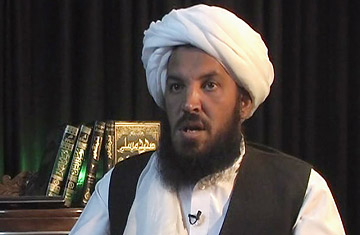
In this file photo, Libyan al-Qaida commander Abu Laith al-Libi speaks during a videotaped interview at undisclosed location.
A U.S. Predator strike on a militant compound in Northwest Pakistan may have killed a top al-Qaeda operative. If confirmed, the death of Abu Laith al-Libi, believed to be one of the highest-ranking leaders of the terror group after Osama Bin Laden and Ayman al-Zawahiri, would be a coup in the war on terror. But it is also an embarrassment for President Pervez Musharraf, who has repeatedly said that he will not sanction U.S. attacks against al-Qaeda targets thought to be regrouping in Pakistan's ungoverned tribal lands along the border with Afghanistan.
Al Libi is said to be behind many al-Qaeda operations, including a suicide bombing targeted at U.S. Vice President Dick Cheney during his visit to Afghanistan last year; he is closely linked with both the Taliban movements in Pakistan and Afghanistan. Authorities have not confirmed the Tuesday morning attack, but sources in the area told the Associated Press that the compound may have belonged to a tribal leader linked to Baitullah Mehsud, the head of the newly unified Pakistani Taliban and the man charged by both the Pakistani government and the CIA with planning the assassination of former Prime Minister Benazir Bhutto on December 27.
Musharraf's government has long maintained that U.S. troops would not be allowed to conduct operations on Pakistani soil. Last month the President said in an interview with Singaporean newspaper The Straits Times that U.S. troops would be considered "invaders" if they crossed the border in the pursuit of al-Qaeda militants. However, similar Predator drone attacks in the area seem to indicate a certain level of cooperation between Pakistani and U.S. intelligence. In January of 2006, a botched American air strike in the town of Damadola, meant to take out al-Qaeda number two Ayman al Zawahiri, killed his son-in-law and some 16 civilians — earning Musharraf widespread criticism for allowing the U.S. to attack targets within Pakistani borders. Another strike in October, on a suspected militant training camp in nearby Baijur district, killed some 80 men. The Pakistani government took responsibility for the attack, but many in the region suspect that the missiles came from a predator drone.
Neither U.S. nor Pakistani officials have officially confirmed Tuesday's predator attack, but such joint maneuverings come as little surprise to Pakistani analysts. "This is nothing new," says defense analyst Nasim Zehra. "Coordinated attacks using Pakistani intelligence and U.S. firepower have been accepted by many levels of governmental institutions, but for deniability purposes no one will ever confirm what happened."
Musharraf, increasingly unpopular since his dismissal late last year of the Supreme Court — which was poised to invalidate his recent re-election on constitutional grounds — will likely face even more popular opprobrium following the latest attack. But, says Zehra, this should not be confused with Pakistani reluctance to pursue terrorists. "It would be erroneous to draw any conclusions from public criticism against Musharraf for letting in U.S. forces. In the greater context, there is a lack of trust between the people of Pakistan and Musharraf's government. Because of his lack of political legitimacy there is bound to be criticism, but that does not mean that Pakistanis do not want terrorists to be stopped."
Retired Lt. General Talat Masood, who recently signed an open letter asking Musharraf to step down as president, says this attack, if it did kill al Libi, "shows that our intelligence is getting better, and that sometimes the Predator drones do work." However, he cautions, "It gives the impression that Pakistani sovereignty has been breached, and that builds resentment." Recent remarks by U.S. Defense Secretary Robert Gates that the United States is "ready, willing and able" to conduct joint combat operations against rising militancy in Pakistan has only inflamed tensions. The prevailing opinion is that for the past six years Pakistan has been fighting America's war on terror, and has gained nothing but a virulent crop of suicide bombers ready to take revenge.
"There is a great indifference to this war," says Masood. "So even if such an important leader is killed, it does not make waves. More educated people will see it for what it is — a successful blow in the battle against terrorists and al-Qaeda. For the others, it will be just one more mark against Musharraf." Despite battlefield victories, Pakistan's president will likely continue to find the war for public opinion difficult to win.
